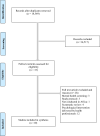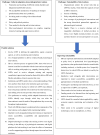Cultural adaptation of psychological interventions for people with mental disorders delivered by lay health workers in Africa: scoping review and expert consultation
- PMID: 35168650
- PMCID: PMC8845308
- DOI: 10.1186/s13033-022-00526-x
Cultural adaptation of psychological interventions for people with mental disorders delivered by lay health workers in Africa: scoping review and expert consultation
Abstract
Background: Lay Health Workers (LHW) are important providers of community mental health services and help mitigate access and treatment gaps in Africa. However, there is a paucity of knowledge about the role and performance of these workers, as well as about the extent to which the interventions delivered are culturally adapted to the African context.
Aims: This scoping review aimed to explore the content and aspects concerning the cultural adaptation and sustainability of psychological interventions delivered by LHW to people with mental disorders in Africa.
Methods: We conducted a scoping review of the peer-reviewed literature published from January 2000 to December 2018 to identify psychological interventions delivered by LHW for people with mental disorders in Africa. We systematically searched PubMed, Google scholar and Hinari to select relevant publications. The articles were evaluated for risk of bias according to study design with the National Heart, Lung, and Blood Institute's (NHLBI) Quality Assessment Tools. Expert consultation was performed according to Arksey & O'Malley framework and cultural adaptation analysis was performed according to Bernal framework.
Results: Out of 14,549 retrieved records, we identified ten peer-reviewed articles conducted in Zimbabwe, Uganda, South Africa and Zambia describing four distinct interventions. Six were randomized controlled trials; none addressed implementation outcomes. Group-based interpersonal therapy (n = 5), trauma-focused cognitive behaviour therapy (n = 1), problem solving therapy (n = 3) and narrative exposure therapy (n = 1) emerged as psychological interventions delivered by LHW for people with depression, anxiety, trauma and suicidal behavior. Psychological interventions delivered by LHW in Africa were all culturally adapted to meet the competence of LHW. All the interventions were associated with symptom improvement, but the quality of this evidence varied widely with study design.
Conclusion: Task-shifting psychological interventions delivered by LHW after appropriate cultural adaptation show promise for addressing unmet mental health care needs in Africa. More effectiveness and implementation evidence is needed, especially with regard to psychological interventions delivered by LHW for adolescence, older people and those with severe mental disorders and suicidal behaviors.
Keywords: Africa; Cultural adaptation; Lay health workers; Psychological interventions.
© 2022. The Author(s).
Conflict of interest statement
The authors report no conflicts of interest.
Figures
References
-
- Patel V, Chisholm D, Parikh R, Charlson FJ, Degenhardt L, Dua T, et al. Global priorities for addressing the burden of mental, neurological, and substance use disorders. In: Patel V, Chisholm D, Dua T, Laxminarayan R, Medina-Mora ML, et al., editors. Disease control priorities, third edition (volume 4): mental, neurological, and substance use disorders. Washington, DC: The World Bank; 2016. - PubMed
Publication types
Grants and funding
LinkOut - more resources
Full Text Sources
Medical



